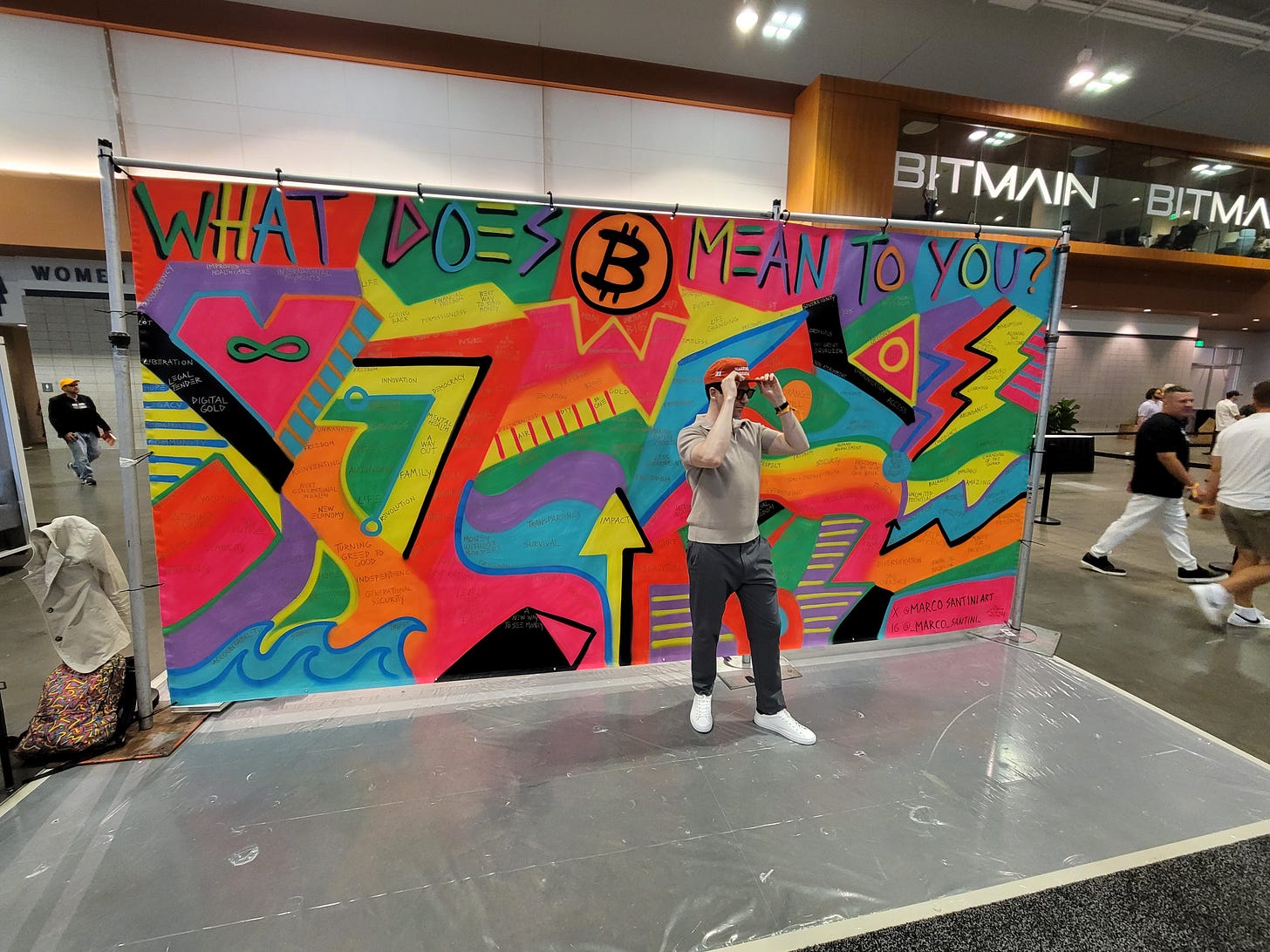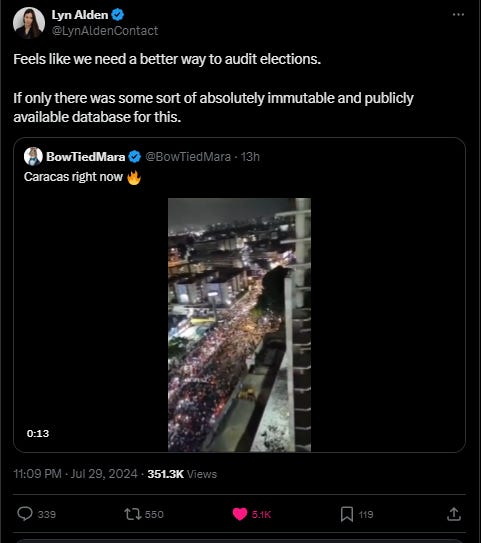Protection from the memory hole, and promoting green energy
What are blockchains actually good for?
As you know, I was at the Bitcoin 2024 conference last weekend. Here is an appropriate photo for our theme today.
I think when a lot of people look at bitcoin, or blockchain technology generally (to the extent they can even explain what that is, and that is part of my point here), they really want to know, what practical value is this? You say “digital gold”, more often than anything else seems like people are promoting it as a get rich quick scheme - what are these technologies doing that will actually improve the world in a way we could not have done without them?
That’s an excellent question. Two answers that could be offered that I find fascinating, that are being put into use right now, are protection from the memory hole, and the promotion of green energy.
Protection from the memory hole
One of the things that is fascinating about technology is that after we create a new technology for this reason over here, we discover there is all kinds of other stuff we can do with it, often stuff the original inventor never considered. Like, we didn’t invent GPS so you can track your Dominos delivery driver on his way to your house (and think about all the other technologies required to make that possible too). But it sure is nice.
One speaker at Bitcoin 2024, speaking of bitcoin, said “we set out to create a new money, and we invented a clock”. Well, what does that mean? Almost the first thing that happened to me in Nashville was the Lyft driver to my hotel, saying (because apparently he was psychic, because I hadn’t said a thing about why I was in town), “so you must be one of those bitcoiners. Can you explain bitcoin to me? Because everyone I ask is giving me a different answer”.
Well, when you’re in one of those moments, and you have like sixty seconds to give an answer before you get dropped off, my go-to answer is usually that bitcoin (blockchains really) is like a giant spreadsheet in the cloud. Everyone can see everything on the spreadsheet (that’s how we keep track of where all the bitcoin is), everything is timestamped and you can also watch how the spreadsheet has changed over time (that’s the critical part here), and you can put however much text you want in every cell of the spreadsheet (not really, for bitcoin, but other blockchains get close). And, because it’s a giant public project, there is no chance at all that someone is going to alter or replace the spreadsheet and try to pass the new off as the original. We’re not trusting Bob with his file on Google drive, this is a gigantic cryptographically secure blockchain project. We’re good.
Well that means, anytime you need to put anything into the public eye, and timestamp it, and say “this right here, this one is the original copy, this is what the original document looked like”, you can do that now. That is a valuable thing in a world where, one, fakery (AI or some other sort of fakery) is getting easier and easier, and in which news organizations increasingly see Orwell’s 1984 as a guidebook to how they should operate as a journalistic institution. Ahem.
So, you probably saw this remarkable story recently, where an Axios reporter says “hey, it’s misinformation to call Kamala Harris the border czar, she was never given that title”. People pointed out that not only Axios, but in fact this very same reporter had called Harris the border czar in an article a few years prior. So Axios apologized for their error… no, Axios went back to their articles from a few years ago and changed them so Harris was no longer referred to in them as the border czar. It was one of the most literal “down the memory hole” moments I had ever seen. The accurate reporting of history is now inconvenient to the present regime, so let us change history. It’s astounding.
Well, blockchains are immutable in the sense that whatever was there originally, and every change that is made, is irrevocably and publicly tracked. So, if every Axios article was posted to the blockchain when it was published, it would be impossible to use the memory hole in this way. Anyone who wanted to could check, “hey, in April of 2021, this is what your article said. You literally can’t change it. No takebacks.”
Where else in life might a public, irrevocable timestamp be a helpful thing? One can imagine other use cases.
You could put literally every vote on a public blockchain as it happened, which would make it at least harder to cheat. Or how about images, which are so easily modified and faked today? Well here, timestamped and certified, is the original photograph, accept no substitutes.
I don’t know a whole lot about their project (though I did purchase one book from them), but I think Canonic.xyz is putting books on the blockchain (they use the BitcoinSV blockchain) for a similar reason. You want to prove that you were the original author of this text? Well here it is, with your name, timestamped on the blockchain. The plagiarist copying you has no such proof.
Promoting green energy
And also, and this is happening in the real world, right now, bitcoin miners are an ideal partner for green energy products, and can actually make them economically viable when they wouldn’t be otherwise. What’s the problem with green energy? You can’t control the weather. So if you want to power a city entirely with solar panels, say, you sort of need to way overbuild. So in the middle of summer, when the sun is shining at a favorable angle all day long, you’re producing way more electricity than you’re using - a lot of it is being wasted. And then in the dead of winter you’re barely getting by.
So, one speaker told a story about one locality in Africa, where the community used, on average, something like 20% of the electricity produced by the local utility. But the utility had to charge them as if they were using 100%, because they had to build all this production stuff and infrastructure, after all, somebody has to pay for that. Well, bitcoin miners are super useful here, because they turn electricity into productivity (verifying transactions on the blockchain), and because they can very easily be turned on and off (there are so many in the world, it doesn’t matter at all if this set of them over here goes offline for a while). So the miners show up. They say “we will purchase all your excess electricity when you have excess, and we will just turn ourselves off when you have a shortage”. And the people in the community therefore saw a significant decrease in the cost of their electricity. This really happened. That’s great.
You might be thinking “does it have to be bitcoin, wouldn’t something else work?”. Yeah, any productive activity that can easily turn itself on or off based on whether or not excess electricity is available should work… but we’d probably be hard pressed to come up with one as flexible as bitcoin mining, actually.
And so, now, the green energy companies are figuring this out for themselves, and realizing that if they need a loan for this wind project, they can make their project more economically viable by saying at the get-go, “and any time we have excess electricity we will turn on our bitcoin miners and make some money that way”. It’s a fascinating thing.
THE END
Affiliate Links
Swan Bitcoin: http://swan.com/davidshane



David, "any productive activity that can easily turn itself on or off based on whether or not excess electricity is available should work":
Have you heard of https://seti.berkeley.edu/participate/? I'll guess you have.
It's a search for extraterrestrial life project that asks people to donate their idle computer processing power to run a program called SETI@home to look for signs of intelligent life out there in the universe.
Ok, I still really don’t get it.